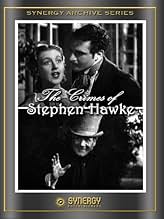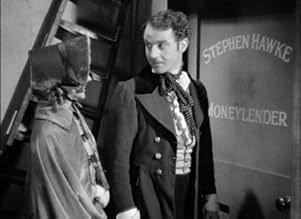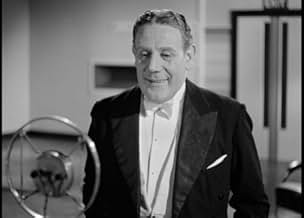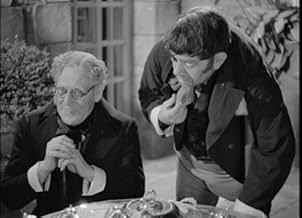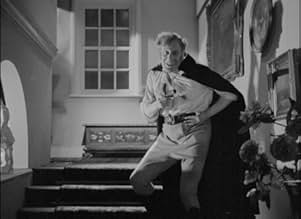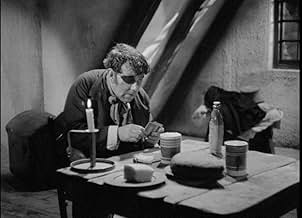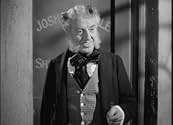Ajouter une intrigue dans votre langueA crazed killer known as "The Spinebreaker" is terrorizing London with a series of grisly murders. The police seem powerless to stop him.A crazed killer known as "The Spinebreaker" is terrorizing London with a series of grisly murders. The police seem powerless to stop him.A crazed killer known as "The Spinebreaker" is terrorizing London with a series of grisly murders. The police seem powerless to stop him.
Graham Soutten
- Nathaniel
- (as Ben Soutten)
B.C. Hilliam
- Self
- (as Flotsam)
Malcolm 'Mr. Jetsam' McEachern
- Self
- (as Jetsam)
Cecil Bevan
- Small Boy's Father
- (uncredited)
Annie Esmond
- Small Boy's Nanny
- (uncredited)
Jack Sharp
- Policeman
- (uncredited)
Harry Terry
- First Prisoner
- (uncredited)
Ben Williams
- Prison Warder
- (uncredited)
Histoire
Le saviez-vous
- AnecdotesMarjorie Taylor's debut.
- Citations
Joshua Trimble: Yes, my boy. When people talk of flint-hearted money-lenders, they can't have met Stephen!
- ConnexionsFeatured in Doom Asylum (1987)
Commentaire en vedette
You owe it to yourself to see at least one Tod Slaughter film. His signature movie Sweeney Todd, The Demon Barber of Fleet Street or the career overview Crimes at the Dark House are two of the best examples, but The Crimes of Stephen Hawke is a worthwhile introduction to his work. Like most of the early Slaughter movies it seems uneasy about the (then) new film medium favouring more common forms of entertainment. His debut film Maria Marten or the Murder in the Red Barn opens with the entire cast being introduced like in a play and Crimes opens like a radio show complete with some hard to watch variety acts (singers Flotsom and Jetsom and a `comic' butcher) before Tod Slaughter is brought on to introduce his latest piece of `Strong Meat'. In the subsequent film/ radio play Slaughter (real name: Norman Carter Slaughter) plays the title role, an outwardly respectable moneylender who is really serial killer `The Spinebreaker' nicknamed for his ability to snap his victim's spines. His long time friend Joshua becomes his latest victim, however upon discovering the guilty party Jossua's son seeks revenge, forcing Hawke and his sidekick, an eyepatch wearing, one legged hunchback to flee, leaving Hawke's adopted daughter in the blackmailing hands of an upper class `lecherous brute'. For a film that barely passes the hour mark this manages to cram allot in, including a fake `talking' corpse, Hawke sent to jail for a year (for stealing a loaf of bread!), the obligatory romance, the honest guy vs the slimey rich guy for Hawke's daughter's hand and even some unexpected sensitivity. Its worth noting that the British censors banned all horror films during the WW2 years, although this falls a few years short of the censor's ban, during that time Slaughter was still making `meldrodramas' with tent pegs pounded into heads, human flesh stuffed into meat pies and lines like `I'll feed your entrails to the pigs' that were far more lurid than any banned Hollywood horror movie. Crimes opens to a sadistic scene where a pompous child is attacked by Slaughter and has his back broken, such scenes like that are not common in British movies of the time. Equally don't look for sub-plots about people being tortured with whips in Ealing comedies. Yet Slaughter's performance is incredible, extremely theatrical and barnstorming par excellence. You can almost hear the boos from the audience as he exits a scene giggling and cackling after `coming to grips' with some unfortunate. Some of the berserk expressions he makes in this film as he breaks spines makes it hard to believe he hadn't completely lost his mind. Call it hammy or over the top, but you'll never forget it. The director George King deserves credit for preserving most of Slaughter's body of work on film (even if he doesn't do it very well). Seemingly more comfortable on stage than on film, Slaughter's movies are little more than filmed plays, with cardboard sets, minimal (if any) camera movement, and unexceptional repertory players. Slaughter is the only reason to watch any of his films, for further proof see King's other Slaughter-less films like The Case of the Frightened Lady (1941) the old magic simply isn't there. Tales from Slaughter's theatre days are both hilarious and the stuff of legend. Actresses not needed would dress as nurses (in case anyone died of a heart attack), while Slaughter reviled in the sort of grand guignol butchery that could never be shown on film and would walk around after the show in blood stained clothes. Whether all these tales are true its hard to know. My relatives remember seeing the guy `live' sometime in the Forties and the man himself definitely left an impression running around the audience covered in blood (actually beetroot juice), waving a big knife and offering to `polish people off'. Now dead for nearly half a century, Slaughter's films are the nearest we'll ever come to experiencing such mad genius first hand. Technically the movies should be unwatchable, but they exert a strange fascination that you'll have to see for yourself, there really hasn't been anything like them before or since.
- gavcrimson
- 16 avr. 2000
- Lien permanent
Meilleurs choix
Connectez-vous pour évaluer et surveiller les recommandations personnalisées
Détails
- Durée1 heure 9 minutes
- Couleur
- Mixage
- Rapport de forme
- 1.37 : 1
Contribuer à cette page
Suggérer une modification ou ajouter du contenu manquant

Lacune principale
By what name was The Crimes of Stephen Hawke (1936) officially released in Canada in English?
Répondre
